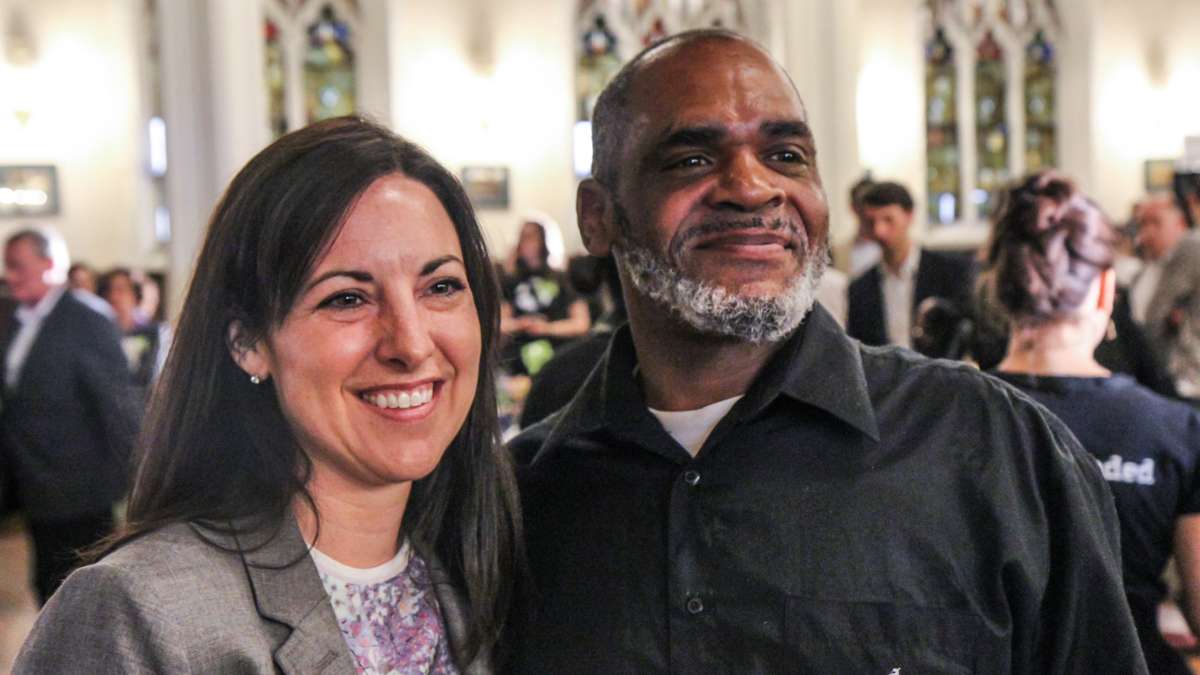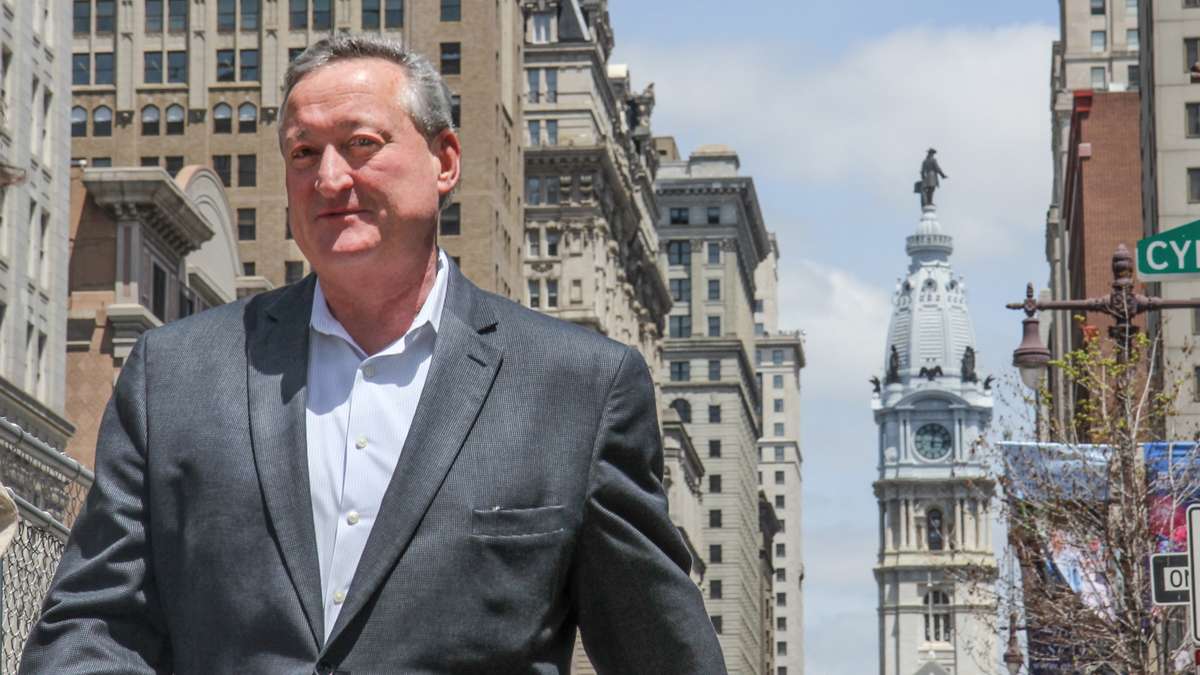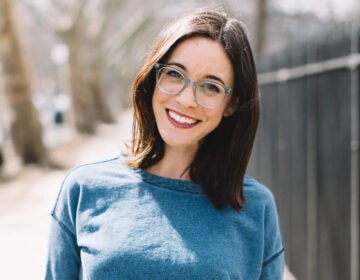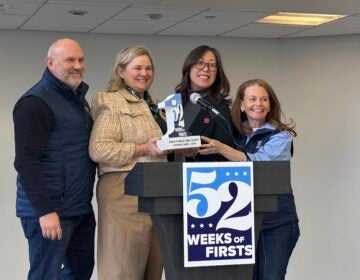Mayoral candidates Jim Kenney and Melissa Murray Bailey choose Broad Street Ministry over the Palm
Maybe it was political symbolism. Maybe it was a sign of a respectable mayoral-campaign to come.
Whatever it was that led Philadelphia mayoral candidates Jim Kenney (D) and Melissa Murray Bailey (R) to share a Broad Street Ministry luncheon table with Gov. Tom Wolf on Wednesday, Bill Golderer hoped it represented a city “moving away from this tone of finger pointing and blame assigning and instead moving toward a place where we’ll all work together” to battle civic challenges.
“This is a common truth that our candidates for mayor know: We need each other,” said Golderer, the Broad Street Ministry‘s convening minister. “It’s a really important message that you’re sending today, that in the end we will be judged as a city by how well we do for those among us who are most vulnerable and most despairing.
“While others are probably already crowding into a ballroom somewhere, you have made a principled choice to be here among the community, among the people. It’s a new day that’s dawning in Philadelphia leadership.”
How this came to be
Part of what led Golderer to that conclusion traces back to a mayoral forum held there on May 7.
The two mayoral candidates left standing were the only ones to arrive on time, much to the chagrin of Sister Mary Scullion.
According to Golderer, Kenney said that night that if he won Tuesday’s primary, he’d eschew the local political-world’s traditonal lunch at the Palm to eat at the ministry. He also requested it be a fundraiser, and that his November foe be invited.
Golderer, taken aback by the offer, got to work planning the “Next Mayor’s Community Luncheon.” (Menu items: spinach parmesan risotto; blue cheese, red pepper and arugula stuffed flank steak with raspberry balsamic reduction and apple walnut cake.)
Murray Bailey, who ran unopposed in the Republican primary, accepted the invitation but Golderer waited until votes were being counted on Tuesday night to actually print signs listing Kenney as an attendee.
“This is the first step toward a tomorrow where everyone belongs,” Golderer said. “Everyone is part of a Philadelphia where they know they are cherished.”
The candidates speak
While attendees were still eating, both mayoral candidates were invited on stage to speak.
Murray Bailey, who switched party affiliation earlier this year, laid out the odds working against her chances of success, saying that she is not a “sacrificial lamb that the Republicans promised something in return for being here.”
“I’m here because I care and that’s the most important thing that it takes to lead the city in the right direction,” she said, decrying the state of education, taxes, homelessness, poverty levels and struggling working families. “Since 2000, $33 billion has been spent on [political] campaigns. The [United Nations] estimates that it would only take $30 billion to end the international hunger crisis.
“We really need to take a hard look at where our priorities are. Are our priorities truly helping the people who need us the most, our neighbors who are suffering? We need to do everything that we can to prioritize the needs of every citizen in Philadelphia.”
About 15 hours after polls closed on his landslide victory in the Democratic primary, Kenney hearkened back to days when his South Philadelphia neighborhood would rally around their neighbors to draw a contrast to how that spirit doesn’t extend to strangers who are homeless.
“We are responsible for each other. I learned it from my parents and I’ve said this many times in the last day or so, I learned it from the Jesuit priests who taught me at St. Joe’s Prep what it is to be a person for others,” he said. “You’re never truly happy in life unless you’re actually serving someone else.
“So, we need to be about each other. We are responsible for each other. We are human beings in this world that God put us in. Some of us have been successful and have had good luck. Some people have had bad luck. One of the things that bothers me the most about homelessness in general is the specific point that so many people on our streets are homeless veterans. … We have to fix this. We have to fix it as a society, we have to fix it as a nation and we have to fix it as a city.”
He used that into a segue about being proud of “changing the paradigm of post-election lunches from the Palm to Broad Street Ministries.” (Yeah, yeah, Kenney and Wolf stopped by after the luncheon, but as he admitted on stage, he was merely popping his head in to say hello.)
Meeting the press outside
While they avoided campaign issues at the event, Murray Bailey touched on pre-K funding outside and the possibility of Bill Green entering the race as an independent.
For his part, Kenney was also asked about education funding and also about stop-and-frisk, his thoughts on retaining Commissioner Charles Ramsey, how his victory escaped the traditional racial-math equations and impressions on how the general-election race will play out.
“It’s going to be run civilly, respectfully, respecting her as the Republican nominee,” he said. “I’ve seen her work during the course of this whole campaign, going to forums when she was unopposed and doing a good job. I have the utmost respect for her.”
On the possiblity of former council-foil Green entering the race, Kenney said, “If he wants to run, he can run. It’s America.”
WHYY is your source for fact-based, in-depth journalism and information. As a nonprofit organization, we rely on financial support from readers like you. Please give today.









